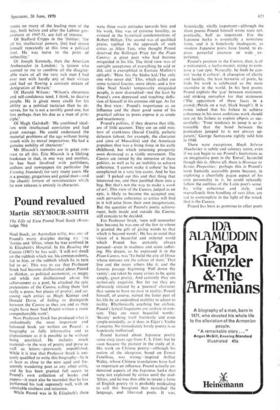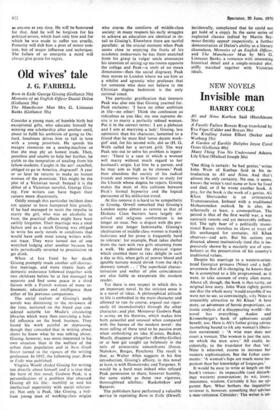Pound revalued
Martin SEYMOUR-SMITH
The Life of Ezra Pound Noel Stock (Rout- ledge 70s) Noel Stock, an Australian critic, was one of Pound's many disciples during the Tate 'forties and 'fifties, when he was confined in St Elizabeth's Hospital. In his Reading the Cantos (1967) he has said: 'I will not dwell on the rubbish which we, his correspondents, fed to him, or the rubbish which he in turn fed to us'. This was to say that Professor Stock had become disillusioned about Pound as thinker, as political economist, as mage; and while not disillusioned about his achievement as a poet, he attacked the epic pretensions of the Cantos, calling them 'not really a poem, but pieces of poetry', And ac- cusing such critics as Hugh Kenner and Donald Davie of failing to distinguish between the Cantos as they are and as they might have been 'had Pound written a more comprehensible work'.
Now Professor Stock has produced what is undoubtedly the most important and balanced book yet written on Pound : a biography as fully informative and as dispassionate as it is possible to be without being uncritical. He includes much material—in the way of poetry and prose as well as letters—previously unpublished. While it is true that Professor Stock is uni- quely qualified to write this biography—he is at least as close to the now aged and fre- quently wandering poet as any other critic, and he has been granted full access to Pound's own collection of books and papers—it must also be recorded that lie has Performed his task supremely well, with an admirable coolness and reticence.
While Pound was in St Elizabeth's there
were three main attitudes towards him and his work. One was of extreme hostility, as evinced in the hysterical condemnations of Robert Hillyer. The second was of qualified praise, typified in the approach of such critics as Allen Tate, who thought Pound deserved the Bollinger Prize for the Pisan Cantos: a great poet who had become misguided in his life. The third view was of outright acceptance of everything he said or did, and is exemplified in Eustaee Mullins's epitaph: 'Here lies the Idaho kid/The only one who never did.' This, which called out some natural fascists, more idiots, and a few (like Noel Stock) temporarily misguided people, is now discredited—not the least by Pound's own depressed and touching defla- tion of himself in his extreme old age. As for the first view: Pound's importance as an influence and the sheer good sense of his practical advice to poets expose it as crude and reactionary.
Pound's politics, if they deserve that title, are of little account. They are an odd mix- ture of crankiness (Social Credit), pathetic delusion (about, for example, the character and aims of Mussolini) and the American populism that was a living force in his early childhood, but which returning prosperity soon destroyed as a viable movement. The Cantos are ruined by the intrusion of these politics, as well as by an inability to achieve coherence. 'I cannot make it cohere' he has complained in a very late canto. And he has said: 'I picked out this and that thing that interested me, and then jumbled them into a bag. But that's not the way to make a work of art'. This view of the Cantos, judged as an epic, is likely to become the accepted one; such pervasive coherence as critics will find in it will arise from their own imaginations. But the question of Pound's poetic achieve- ment, both inside and outside the Cantos, still remains to be decided.
For Professor Stock, 'men will remember him because he was one of the few to whom is granted the gift of giving words to that which is beyond words'. He has in mind that vision of a beautiful and ordered world which Pound has certainly always pursued—even in madness and acute suffer- ing. His dream, as he expressed it in the Pisan Cantos, was 'To build the city of Dioce whose terraces are the colour of stars.' That line and the many others like it, and the famous passage beginning 'Pull down thy vanity', are taken by many critics to be, quite simply, great poetry. And certainly they are technically exquisite. But for me they are ultimately vitiated by a 'poetical' character that seems to have no root in reality; Pound himself, of course, ruined the latter part of his life by an undoubted inability to adjust to reality. Rhythmically anything but archaic, Pound's lyrical fragments are archaic in con- tent. They are mere beautiful words : 'Beauty' seeking itself fruitlessly and even simple-mindedly, as it does in Elgar's Violin Concerto. No immediately lovely poetry is so hopelessly ineffectual.
Pound learned about Japanese poetry some sixty years ago from F. S. Flint; but he soon became the pioneer in the study of it. His work on Chinese poetry—although his notion of the ideogram, based on Ernest Fenellosa, was wrong—inspired Arthur Waley, whose Chinese translations have had so important an influence. Pound actually un- derstood aspects of the Japanese haiku that were not explained by critics until the mid- 'fifties; and he was thus able to invent a form of English poetry (it is probably misleading to call this Imagism) that revivified the language, and liberated poets. It was, historically, vitally important—although the short poems Pound himself wrote were not, poetically, half as important. For the Japanese haiku is essentially a miniature form, and it is hopelessly inadequate, as modern Japanese poets have found, to ex- press powerful emotion or wide ex- perience.
Pound's position in the Cantos, then, is of a miniaturist, a haiku-master, trying to com- pose a vast epic. Naturally, he finds he can- not 'make it cohere'. A champion of clarity and lucidity, the least hermetic of poets, he finds his work is celebrated as the most recondite in the world. In his best poems Pound exploits the 'gap' between statement, and striking metaphor for that statement ('The apparition of these faces in a crowd; /Petals on a wet, black bough'). It is ironic indeed that his failure to achieve coherence in his most ambitious work should rest on his failure to exploit ellipsis as suc- cessfully: 'Your tendency to jump is so ir- resistible that the bond between the particulars jumped to is not always ap- parent,' George Santayana rightly told him in 1940.
There were exceptions. Hugh Selwyn Mauberley is subtle and salutary satire, even if we can begin to see Pound's limitations as an imaginative poet in the 'Envoi', beautiful though this is. Above all, there is Homage to Sextus Propertius: perhaps this is Pound's most humanly accessible poem because, in exploring a cheerfully pagan aspect of his own personality in it, he could relaxedly follow the outlines of the Latin poet's sense. Its witty coherence and style, and marvellously firm handling of vers libre, are sad to contemplate in the light of the wreck that is the Cantos.
Pound has been as generous to other poets as anyone at any time. He will be honoured for that. And he will be forgiven for his political errors, which hurt only him and for which he was made to suffer too cruelly. Posterity will dub him a poet of minor con- tent, but of major influence and technique. The failure of so energetic a mind will always give pause for regret.



































 Previous page
Previous page